Pam Parker's Blog, page 2
March 19, 2018
Invisible & Silent No Longer
For societal changes to occur, someone must find their voice and inspire others to work toward those changes. Invisibility and silence do not lead to change.
In the United States, one of the most recognized voices for change belonged to Dr. Martin Luther King who spoke eloquently and passionately for civil rights, igniting others to work for the cause. As he predicted, he did not live to see all the desired changes, but he surely helped them happen. Had he lived, perhaps he would have been able to continue the calls for justice enough that we wouldn’t now need #BlackLivesMatter, but sadly, we do. That movement has been active for five years and we still need it! We need all the people who continue to call attention to the pervasive racism in our country — to pull it out from invisibility, to post the damning videos and pictures and force this nation to confront the lingering racism in our communities.
More Voices RisingIn the last year, we’ve seen two other very needed social movements rise: #MeToo — opposing sexual abuse against women, and #NeverAgain — advocating for sanity in our gun laws and stricter gun control. Time will tell how history views these pushes for change, whether they’ve been effective and who will be linked to them. In the case of #MeToo, we’ve already seen a media rush to label Alyssa Milano as the creator of that movement, while Alyssa herself acknowledges that Tarana Burke had called for abused women to share their stories years earlier. Emma González is likely to become the person most linked with #NeverAgain, and I am sure, from what we’ve seen of this smart, courageous young women, that she won’t be happy with that label. To her credit and those around her, they appear to be born collaborators. Thank goodness!
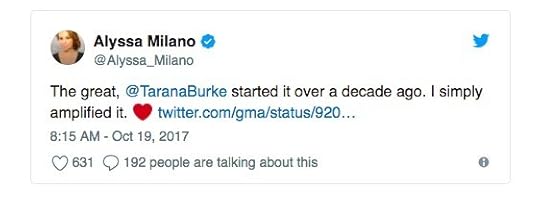
Alyssa and Tarana were born in the early 1970s, Emma in the year 2000. They were born in time to benefit from Women’s History Month, Emma most of all. Women’s History Month, observed in March, began in 1987, encouraging teachers across the nation to include curriculum addressing women’s stories that had been neglected in most classrooms forever. Black History Month came to be in 1976, for the same reason — to shine a light on the often-neglected stories, accomplishments, and contributions of blacks to U.S. history. To be sure, there is no guarantee these ideas will be integrated into classrooms, but over time, the stories filtered into text books.
I taught social studies, U.S. history, in middle school from 1994–2001. Our text book had some sections devoted to stories I had never studied when I was in school — women’s stories, Native American stories, black’s stories. Because of my own interest and experience as a student at Mount Holyoke College, I probably added more women’s history to my curriculum over the years. I remember trying to time our studies of the Civil War to fall in February and focus more on the black experience before, during and after that war. Also, since I was teaching at a Jewish school, I sought stories of Jews in U.S. History.
I was born in 1960. Women were rarely studied in my learning of our country’s history. They were invisible, silent and absent, even though the majority of our teachers were women — at that time, one of the few professions welcoming to women.
But, thanks to the women’s movement of the late 1960s, when my generation (the tail end of the baby boom) left for college, women were making inroads in many more areas: doctors, lawyers, business execs, and later, even astronauts! By no means do I mean those women had it easy, but young women in later generations would come to see more outside work possibilities for themselves beyond teaching, nursing, being a secretary — women in Emma González’s generation can rightly believe that they can do anything they want.
https://medium.com/media/c7e3da98e7f7f28adf863452c0bf2ce8/hrefThe fact that this young woman — she’s only 18! — can go on national television and speak, passionately and intelligently, about her beliefs and inspire others to join in the quest for #NeverAgain speaks volumes about the importance of Women’s History Month. Emma has grown up in an environment where women are no longer invisible and silent. May she persist in all her advocacy efforts — I understand she also works hard for LGBTQ rights. You go girl!!
Thank you, Emma Gonzalez, and all the other young women and men who are working with you to call B.S. on our nation’s status quo regarding guns. Your foremother’s are watching, writing, marching, sending money and learning that we too can no longer be invisible and silent.

Thank you to all the women who worked tirelessly for the creation of Women’s History Month. Thank you for the theme this year: Nevertheless She Persisted: Honoring Women Who Fight Against All Forms of Discrimination Against Women.
May the young women, who’ve grown up aware of the achievements of women in our country and who’ve been encouraged to speak and be heard, persist in calling out what is wrong! I pray our history in the future will no longer need specific months to focus on different groups, but we will teach and learn an integrated history which no longer only focuses on one group, but on all of us in this beautiful, still melding, melting pot.

Invisible & Silent No Longer was originally published in Pam Writes on Medium, where people are continuing the conversation by highlighting and responding to this story.
March 12, 2018
#ReadMoreWomen
I have an essay up on The Writing Cooperative called Yes, Writers Must Read, Read, Read: Ideas on Varying Your Reading (or #ReadMoreWomen). While it is targeted for writers, it applies to all readers. And, it includes my reading list thus far in 2018. Hope you’ll enjoy. (And, if you read the article and appreciate it and the reading list, feel free to share and clap mightily. :-) )
 Just a few of the books I’ve enjoyed so far in 2018.
Just a few of the books I’ve enjoyed so far in 2018.
#ReadMoreWomen was originally published in Pam Writes on Medium, where people are continuing the conversation by highlighting and responding to this story.
February 28, 2018
Reading, Visiting, Inhaling
At the end of 2017, I chose a word for each month of 2018 to try to reflect on — February’s word has been health, but I’ve written little about health. I have been attending to my own health — trying to eat right, exercise often, journaling more because my daily habit has slipped a bit and that is BAD for my mental health. But, I didn’t ponder the word as much as I had January’s word, HOPE.
 © PamWrites 2017The Good Things I Did for My Health in February:I read and listened to a lot of good books: Lab Girl, by Hope Jahren, Life on the Loose: My Journey from Suburban Housewife to Outdoor Guide, by Cari Taylor-Carlson, Flight Behavior, by Barbara Kingsolver, The Art of Misdiagnosis: Surviving My Mother’s Suicide, by Gayle Brandeis, The Mothers, by Brit Bennett.I visited family and friends in New England — managing to see folks in Connecticut, Massachusetts, New Hampshire and Vermont. Only missed Rhode Island and Maine. A dose of old friends is good for the soul, with nods to Bob Seger.Since certain substances are legal in Vermont, I also inhaled something I hadn’t in many decades. Some would argue that wasn’t good for my health, but I’d say they were wrong. The subsequent laugh-a-thon was extremely good for my health.During a flare up of spondyloarthritis, I dragged my aching joints to the rheumatologist and increased some meds — and yes, things are calming down. Sometimes, a plain old doctor visit is needed for one’s health.
© PamWrites 2017The Good Things I Did for My Health in February:I read and listened to a lot of good books: Lab Girl, by Hope Jahren, Life on the Loose: My Journey from Suburban Housewife to Outdoor Guide, by Cari Taylor-Carlson, Flight Behavior, by Barbara Kingsolver, The Art of Misdiagnosis: Surviving My Mother’s Suicide, by Gayle Brandeis, The Mothers, by Brit Bennett.I visited family and friends in New England — managing to see folks in Connecticut, Massachusetts, New Hampshire and Vermont. Only missed Rhode Island and Maine. A dose of old friends is good for the soul, with nods to Bob Seger.Since certain substances are legal in Vermont, I also inhaled something I hadn’t in many decades. Some would argue that wasn’t good for my health, but I’d say they were wrong. The subsequent laugh-a-thon was extremely good for my health.During a flare up of spondyloarthritis, I dragged my aching joints to the rheumatologist and increased some meds — and yes, things are calming down. Sometimes, a plain old doctor visit is needed for one’s health. Rochester, VT © PamWrites 2018
Rochester, VT © PamWrites 2018Yes, I have things I can do better and they are simple:
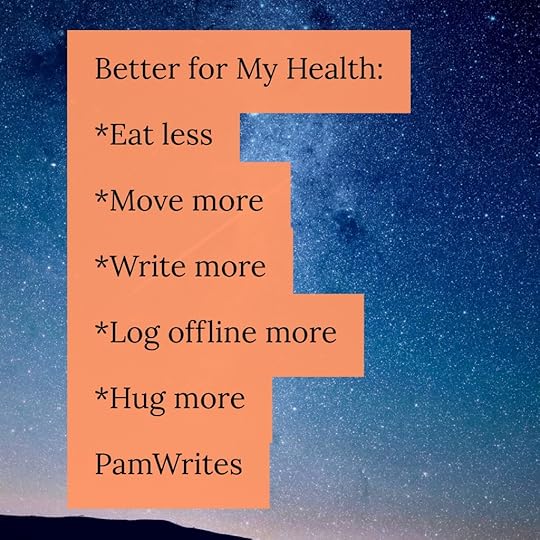
But all in all, ’twas a speedy, but good month — looking forward to March where the word of the month is SPIRIT. What word will you focus on?

Reading, Visiting, Inhaling was originally published in Pam Writes on Medium, where people are continuing the conversation by highlighting and responding to this story.
February 24, 2018
Can you respect the work when the creator is a jerk?
When the Harvey Weinstein accusations thrust the #Metoo movement onto our screens and newspapers, as the movement gained steam and women felt empowered to share their stories, I kept avoiding a question that was niggling at me. Can I respect the work when I can’t respect its creator? For example, when the charges against Bill Cosby snowballed, I loathed him and his probable abuse of power, but I couldn’t deny that I had enjoyed the Cosby show. I had. But I’ll NEVER watch it again.
Kevin Spacey? An amazing actor. And I NEVER want to watch him perform again.
When Rumors Bear TruthI want to believe and see the best in people. That is part of my nature and wiring. So when my sons were in high school and I heard some ugly rumors about the theater director at their school, I didn’t believe the rumors. (Yes, there had been rumors about Weinstein, Spacey and others swirling for years. Sometimes rumors are merely manifestations of truth, not always of course, but sometimes. That didn’t occur to me at the time of hearing the rumors.) When that director left rather abruptly at the end of one school year to go to another district, the public reasons seemed to make sense. I didn’t give it much thought. But that same director was put on “administrative leave” beginning around Thanksgiving last year (around the time that #metoo was still rolling strong and spreading in many fields). Administrative leave in schools generally means that the employee is paid while an investigation into possible misconduct occurs. I don’t know if that’s the meaning in the director’s district, but it is a reasonable guess. Said director recently resigned. So, no, I don’t know what’s happening there but I know something smells bad.
Really bad.
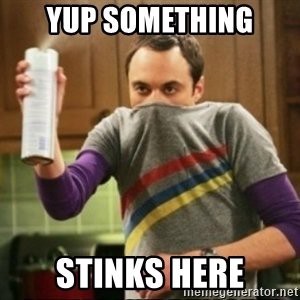
It seems likely that those ugly rumors I’d dismissed were true. That incident provoked my questioning more than anything — because I knew the man and had respected him and worked fairly closely with him . This wasn’t about a celebrity whose world and mine were unlikely to ever collide. The question rose again: could I respect the work when the creator was a jerk? Yes, he was a terrific director. But, if this situation plays out to reveal he was a predator/harasser, will I ever want to see anything else he directs or performs in? Nope.
Predators & Harassers — Surely not in the literary world?Somehow, in my thinking, I had naively and hopefully (and foolishly), wanted to believe the literary world might be more immune from the mean men found in the Hollywood #metoo movement.
Wishful thinking of the most ridiculous kind. Guilty as charged.

In my Facebook feed, I saw posts from female authors, many of them in academics, talking about harassment, still afraid to specifically call anyone out. Afraid of job implications. And so, yes, I knew the literary world was not immune to predators, harassers and general egotistic, power-hungry penis-bearers (for the most part). But, my favorite authors? No way.
I know, I know. Wishful thinking of the most ridiculous kind, part deux.
I loved Sherman Alexie’s memoir, YOU DON’T HAVE TO SAY YOU LOVE ME, about his complicated relationship with his mother. And, I applauded his stepping back from the book tour when he did last fall, supposedly for his depression. In fact, I documented my gratitude to him at Invisible Illness with When Grief is Complicated — An Open Thank You Letter to Sherman Alexie.
But, his name has come up in connection with the Anne Ursu story, Sexual Harassment in the Children’s Book Industry. More information following that story can be found at School Library Journal, Children’s Publishing Reckons with Sexual Harassment in Its Ranks, and a post documenting comments from the School Library Journal article called A Comprehensive List of the Recent Kidlit Sexual Harassment Allegations. It’s in that final post that Alexie’s name, and others, come out.
To date, I have not seen any response from Alexie to these accusations. And, no, I’m not aware of any formal charges. But know what? No, what? I believe the accusers. And I’m so sad.
I even wonder a lot about the reasons behind his withdrawal from the book tour. Was it related to some women beginning to call him out? Or fears of that happening? His withdrawal predated the beginning of the avalanche of #Metoo last October, but, still, one has to wonder.
And I don’t know if I’ll be able to read Alexie’s work again. But, I don’t feel like I should.
Roxane Gay said it best in an essay in Marie Clare earlier this month, Can I Enjoy the Art but Denounce the Artist? :
“We can no longer worship at the altar of creative genius while ignoring the price all too often paid for that genius.”
While I said to myself that I was questioning whether I could respect the creation while disrespecting the creator, I have to be honest and see that I had already come to the conclusion that I could not separate the two. I thought maybe I should be able to separate the two, that was truly more of what I was questioning. But Gay’s essay helped me clarify that no, in fact, I don’t have to separate them. I should remain opposed to supporting artists who have treated others with such blatant disregard and disrespect. Or, in her words,
“There are all kinds of creative people who are brilliant and original and enigmatic and capable of treating others with respect. There is no scarcity of creative genius, and that is the artistic work we can and should turn to instead.”

Can you respect the work when the creator is a jerk? was originally published in Pam Writes on Medium, where people are continuing the conversation by highlighting and responding to this story.
February 20, 2018
When Theater Kids Rise Up, They Will Be Heard
Health. I made a commitment to focus on a word each month and it’s health’s turn. I had something planned for the 15th, and then, the Parkland, FL shooting happened. Hope was January’s word and it flew away that day.
Like so many in the U.S., the fight went out of me. Then, the anger welled. Again. Again, and again, and again. And I stewed, why can’t we fucking stop the bloodshed? Why can’t we, as a nation, acknowledge we are in a public health crisis and deal with it?
When those surviving students first began to speak, how I ached for them. Oh, honies, I thought. You’re going to learn the hard way. Nothing will change. Not a fucking thing will change. We’re in a strangle-hold of NRA subsidized government control. But, something started to shift.
I felt it. You felt it.
Hope kept pushing at the old words, the old ways. These students, these marvelous, fabulous, wonderful students. Buzzfeed reported about them yesterday and I recommend Here’s What It’s Like at the Headquarters of the Teens Working to Stop Mass Shootings. I learned something I hadn’t known, which didn’t surprise me. These kids — these amazing, wonderful, hard-working students- according to Buzzfeed:
“The group, who mostly know each other from the school’s theater program, began their efforts in a scattered way in the chaotic aftermath of Wednesday’s horror.”
I was/am a theater mom. Those kids, the ones lucky enough to get involved and stay involved, they gain a confidence and strength that the rest of us who never experienced theater can take longer to find, if we do. They find their voices. They learn to use them. When they see a problem, they will work together to fix it. Theater is about collaboration to achieve a unified goal.
Kind of gives you hope, doesn’t it?
These students are pushing our country harder than anyone in our government has been able to — and many have tried. They are offering the perspective the adults stuck in their ways needed — they are the child pointing and shouting about the Emperor not having any clothes! They offer the words the U.S. needs. “We call B.S.” AMEN!!
I am full of hope. And, back to the word of the month, having hope is good for my health. May my country be led by theater kids to find a way out of this endless cycle of needless violence, this public health crisis. May we all stand with those theater kids and their poster child (don’t let any envy disrupt your group kids — Emma didn’t ask for this!):
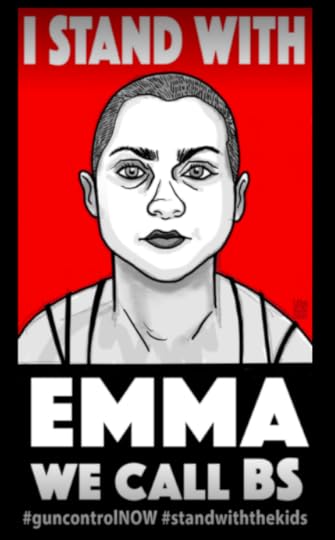

When Theater Kids Rise Up, They Will Be Heard was originally published in Pam Writes on Medium, where people are continuing the conversation by highlighting and responding to this story.
January 23, 2018
Hope & Wrinkles in Time
My focus word for the month of January has been HOPE. Some of us seek hope in beauty in the natural world, in the arts, in a religious faith and community, in physical activity. This weekend my husband and I attended an exhibit at the Milwaukee Art Museum, Degas to Picasso. Viewing art not only stimulates my creative side, but it also fills me with hope. That the brushstrokes, pen and ink scratches and designs before me seek to share — and do — a sensibility from a long-dead artist inspires and moves me.
What are your hope builders? Music serves that purpose for many. Being around babies and small children is a hope-amassing experience for many. And, as I said above, the natural world, the arts and faith are hope builders for me. But perhaps one of the more consistent ways I seek and find hope is through reading.
This month so far I’ve read four books, all by female authors, which happened by chance more-so than intention — though I do intend to try to read more female authors over the course of the year. I’ve already sung my praises for The Glass Eye by Jeannie Vanasco, see here if you missed it. And my reviews are on Goodreads for The Last Laugh by Lynn Freed and My Beloved World by Sonia Sotomayor. I just read A Wrinkle in Time by Madeleine L’Engle which I’d somehow missed in my youth.
If your world includes tween or teenage girls, please be sure they’ve read it, and if they haven’t, get them a copy and read or reread it yourself. It’s a dreamboat full of hope as a young lady — Meg — on the fringe of the crowd (as we all think we are at that age!), learns to trust herself, faults and all, gains confidence and fights onward. (Maybe you’d like any young women in your orbit to have read the book before the movie comes out in March??)
#MeToo and Hope?
As we’ve watched the steady line of young women standing up and calling out Larry Nassar and the US gymnastics professional organizations for the abuse of these young women, I have felt such hope in their strength. Such hope that this branch in the #MeToo movement will grow and extinguish the abuse in time.
I take comfort and hope in these words from A Wrinkle in Time, by Madeleine L’Engle:
“But what’s going to happen?” Meg’s voice trembled. “Oh, please, Mrs Which, tell us what’s going to happen!”
“Wee wwill cconnttinnue tto ffightt!”
Something in Mrs Which’s voice made all three of the children stand straighter, throwing back their shoulders with determination, looking at the glimmer that was Mrs Which with pride and confidence.
“And we’re not alone, you know, children,” came Mrs Whatsit, the comforter. “All through the universe it’s being fought, all through the cosmos, and my, but it’s a grand and exciting battle. I know it’s hard for you to understand about size, how there’s very little difference in the size of the tiniest microbe and the greatest galaxy. You think about that, and maybe it won’t seem strange to you that some of our very best fighters have come right from your own planet, and it’s a little planet, dears, out on the edge of a little galaxy. You can be proud that it’s done so well.”
When the movie comes out, Mrs. Which will be portrayed by Oprah Winfrey and the early looks are pretty spectacular. I’m not a fan of the cult of Oprah, but, I do think she’s the perfect choice to embody Mrs Which and inspire young women to aim high and fight for right.
 From the Disney trailer for A Wrinkle in Time
From the Disney trailer for A Wrinkle in Time
Hope & Wrinkles in Time was originally published in Pam Writes on Medium, where people are continuing the conversation by highlighting and responding to this story.
January 19, 2018
USA Gymnastics — DO YOUR DAMN JOB
I was a gymnast in the 1970s. I was a pretty darn good gymnast, but I wasn’t going to make it to the Olympics. I knew that. I used to have regret and wondered if I should have tried harder. But back then, I knew my fears were too substantial and now, well now I thank God for them.
 Yours truly back in the day.
Yours truly back in the day.Had I worked harder to conquer them and give up a normal life to follow that dream, I might have ended up like the young women we are watching skewer Larry Nassar, the U.S.A. gymnastics team doctor. Aly Raisman slayed him and the United States Gymnastics Federation and the U.S. Olympic Committee in a must watch session today. Don’t miss it. And, don’t forget her words about adult, after adult, after adult not listening to women who spoke out.
Olympic gold medalist Aly Raisman speaks out against Larry Nassar
The most horrific thing about this to me is that it all happened before. To my friend, Marcia Frederick, who I trained with in Springfield, MA over forty years ago. When Marcia told the then reigning U.S. Olympic training coach, Muriel Grossfeld, she was met with silence.
Silence. Sound familiar?
From every adult who could have helped her, she was met with silence. You can read her story here.
Marcia Frederick, first U.S. Gymnastics world champion, shares story of abuse
Don’t think there’s anything new in what’s going on.
Fix the damn problem, USA Gymnastics! Own your responsibility in NOT protecting young girls and driven athletes. They’re at particular risk of manipulation from sleezes in their orbit — sleezes that those girls need to achieve their goals. Doctors and coaches can own these girls if they are not protected.
Do your damn job.
And to all those young women finding their voices, and to my middle-aged friend robbed of her dreams in more ways than I had previously realized, I hurt for what happened to you, but am overflowing with respect and admiration for you finding the courage to speak up. The examples you are setting now will matter more, much more, in the future to the girls yet to be born than all your ribbons, medals and trophies.
I salute you. I applaud you. I wish you never-ending peace.

USA Gymnastics — DO YOUR DAMN JOB was originally published in Pam Writes on Medium, where people are continuing the conversation by highlighting and responding to this story.
January 16, 2018
Assault, Bravado and Me
by Laurel Landis
(Editor’s note — please consider another perspective in the #MeToo/#TimesUp conversations. It’s important we don’t burn out, but evaluate many points of view. Laurel Landis bravely shares her experience and more ideas, including the lack of distinction we apply to the word “assault”, as well as the fact that trauma effects individuals differently.)
When I was 19, I was raped. He was leaving a party and needed help carrying a stack of record albums to his apartment around the corner. I left with him, arms full. As I stepped inside the door, barely in, it slammed shut behind me. I dropped the records. The rest was ugly and scary, and I won’t detail it here. The details aren’t necessary. We all have ideas of what rape is, and trust me, what you’re imagining probably isn’t awful enough unless you’ve been raped yourself.
At some point when the #MeToo accusations began, a voice in my head kept saying, but I’m not traumatized. What are these women crying about?
And the thing is, I’m not. At this point in my life, like most people, I’ve experienced tragedy, deaths of loved ones, disappointment. I’ve made a few terrible life choices and blown some great opportunities, and I can tell you that, when I lay awake at night, I do not think about a rape 37 years ago, vile as it was.
Meantime, this recently from a coworker: 40 years later? I’m expected to have sympathy for these women?
Before responding, I took a deep breath, made sure I didn’t roll my eyes. I reminded her that reporting any kind of sexual misconduct has always been, and still is, a risk for women. Even now women can lose their jobs for blowing this whistle — on a boss, for example. Her response? Well, then that’s their choice, isn’t it? They choose the job.
Hearing her words out loud embarrassed me. She was on fire too. She’s a nice person trying to make sense of it all, so why is her anger directed at the accusers? In her voice I heard something we share — a sort of self-righteous toughness I suspect she’s as proud of as I am.
I didn’t report it either. I’d been drinking at a party. Though I was walking, talking and lucid enough to do both, the fact remained that I definitely had a buzz on, had almost certainly flirted with a few men there, and any one of 30 or so people at that party would have known it.
There is no money in reporting assault. I suppose that, because we now know some of the accusers’ names, we can say aha! See? 15 minutes of fame. But it’s a lousy kind of fame, if you ask me. When we have a President of the United States discrediting one of his own accusers by belittling her looks — she wouldn’t have been my first choice, he said, to applause and laughter — even from women — and when so many women, even some who admitted they believed Roy Moore’s accusers voted for him anyway, the message is pretty clear. What’s more important than a molested little girl or the rape of a grown woman? Why, everything, if it means that a Republican takes the seat instead of a Democrat, or a prominent man gets to keep his status, or conflict is avoided, or ……
It isn’t a big surprise when men brush off and deny women for reporting. After all, that’s why we have this problem. But what causes women to rush to belittle their own, before men can do it for them? Talk to five women friends and you’ll find that at least three have been abused. Stalked by ex-boyfriends, hit by husbands, raped by a stranger, or at the least, groped by someone who held her job or her safety in his hands. When these same women choose to support men who have clearly done wrong, who wouldn’t want to just give up? This is supposed to be our tribe.
Part of the problem in all these revelations, reports and conversations is the lack of distinction in words like ‘assault.” You can’t put a covert pat on the behind in the same category as rape. This is a disservice to me. When Seth Meyer calls Al Franken’s joke photo “horrifying,” it’s pure hyperbole. If a mock breast grope is horrifying, how would one describe the Holocaust? This kind of talk doesn’t help us. Neither do a 30 year gap in reporting, seeing your abuser again, or taking hush money, no matter your reason for doing so, because it’s a world seen by many in black and white, with little patience or understanding for gray.
There’s another reason people don’t report and I suspect it’s equally to blame. For women like me, who like to consider themselves capable and tough, there’s the fear of being seen as fragile, beaten, unable to control our own destinies. Something about weakness makes us want to attack; to rid our pack of that weak link.
 © PamWrites 2018
© PamWrites 2018I don’t want to be defined by one incident in a long life. And spare me the condescending title of “survivor.” Technically, it’s correct. But today it’s used for everything. It implies action, courage. I’m a hero who clawed my way out of the situation. The truth is that for me, like many crime victims, there is only luck to thank-like the luck of a mouse shaking off a faulty trap.
But I also don’t want to be someone who thinks that because I no longer think about this, neither should anyone else. I suspect that women lash out at the accusers because they show us our own lack of action, they show us just how much we have allowed. All that’s left is to join the circle and stone the tattletale.
Is this how we redeem ourselves? Our experiences should not make us smug, they should make us compassionate.
None of these arguments, no intellectual ideas, and none of the ignorance of men or other women make my rape my fault, or less of a despicable act than it was, nor does the passing of decades mean that the fault somehow reverts to me because I kept silent. It is a common phenomenon in our culture to shackle someone’s feet and then make fun of them for being immobile.
Now, the complaints of the accusers begin to bore and annoy, and we can point to them and say god, what a bunch of whiners, and everyone will agree, even those of us who should know better.
About the authorLaurel Landis is a Wisconsin writer whose short stories have appeared in Wisconsin People & Ideas , Lost in Thought , and Rosebud (Mary Shelley contest) among others. Her work is also excerpted in Judy Bridge’s book Shut Up & Write , and broadcast on Milwaukee Public Radio/ WUWM .

Assault, Bravado and Me was originally published in Pam Writes on Medium, where people are continuing the conversation by highlighting and responding to this story.
January 10, 2018
Seeking Beauty, Building Hope
My son and daughter-in-law close on their first home purchase soon — a condo in Washington, DC. My mind drifts to when my husband and I were buying our first, and only, home in suburban Milwaukee, WI. We were excited and feeling rather adult. (Adulting hadn’t become a verb yet.)
Today, thirty plus years after buying that home, we are in the process of paring back. Shedding the accumulation of those three decades. They are diving in. We are climbing out.
Being on the end of that life stage is a challenging part of aging. I see the shedding, the simplifying, the paring back as important, necessary and part of getting older, but it’s hard for an over-sentimental person with a tendency to get attached to things because they each have a story. Also, on the societal level, we’re just not that comfortable in the U.S. with talking about dying. Since aging means we’re getting closer to dying, we don’t really like to talk about that either.
I have lived with an acute awareness of both aging and dying. Some of that is part of my nature. I hated turning nine because I knew I’d never be a single digit again. My father died young, leaving me to expect to die young also. I wrote about that more in Wrinkles & Writing. A line in that post resonates with me still: “But, getting old? The weight our culture gives that word made it stick in my throat like a dry biscuit.”
As I think about the “kids” buying a home and the ‘rents working toward moving out and into something smaller, I remind myself that my word of the month is hope. Where do I see hope in this situation?
Everywhere.
I see hope for my son and daughter-in-law and their future.
I see hope that my husband and I are being realistic and pragmatic, that we will try hard not to leave a mess behind one day for our children to have to deal with. If you missed all the discussion about Swedish death cleaning last year, check out Americans are pack rats. Swedes have the solution. Death cleaning. in the Washington Post.
And, I think of that optimist, Anne Frank, who faced a world gone-mad by choosing to see the good. In doing so, and writing about it, she shared hope. I wish she could know that.
“I don’t think of the misery, but of the beauty that still remains.”
Anne Frank
 c PamWrites 2017
c PamWrites 2017Seeking beauty builds hope. Find it. Share it. Be it.

Seeking Beauty, Building Hope was originally published in Pam Writes on Medium, where people are continuing the conversation by highlighting and responding to this story.
January 7, 2018
One of 40 — Reading 2018
by Jeannie Vanasco
My son and daughter-in-law often sign up for the Goodreads challenge and read numerous books in a year. I don’t think I’ve kept up with them and I’ve also done a poor job of keeping track of the ones I have read. This year, I’ve decided — hesitantly — to join them. I don’t want my reading to feel like “homework” and I don’t want to beat myself up if I don’t keep up the proper pace. Also, I don’t know how to track the other reading that I do — I tend to read a great number of essays and short stories in literary journals during the year, but there’s no way to track that. Hopefully — fingers crossed — I will do better this year with tracking the books I’ve read. My first book for 2018, The Glass Eye: A Memoir by Jeannie Vanasco.
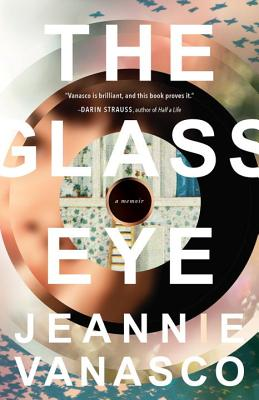
This brilliant memoir is a study in love, grief, obsession and the progressive development of a severe mental illness.
In fragments focused on herself, her father, mother, dead half-sibling (also named Jeanne/ie) and mental illness, Vanasco takes our hand and leads us down a rabbit-hole of obsession and grief following her father’s death. An only child, Jeannie, was especially close with her much older dad.
You might guess this work would be horrific and morbid. It’s not. It is unflinching and honest. The Glass Eye gave me the best sense of what obsession and severe mania can do to someone; yet, there is always an element of hope. (Remember, hope is my word for the month of January. It’s not why I chose The Glass Eye as my first book. I almost passed on it thinking it couldn’t possibly feel hopeful.) We know, since the book exists, that she survived her unraveling and finished the book. I thoroughly enjoyed the sections which were self-analytical about her writing process, but do wonder how much readers who don’t also write would enjoy them (thus 4 stars instead of 5 on Goodreads) — I’m not able to judge if they are overdone, since I found them fascinating.
If you’re not yet on Goodreads, but you are a regular reader, you might consider joining. It’s a great place to track books you want to read and share your thoughts on ones you have read. If you want to follow the books I have listed there, go here.

One of 40 — Reading 2018 was originally published in Pam Writes on Medium, where people are continuing the conversation by highlighting and responding to this story.



